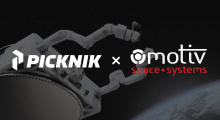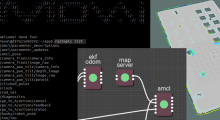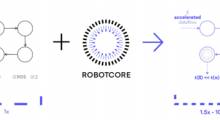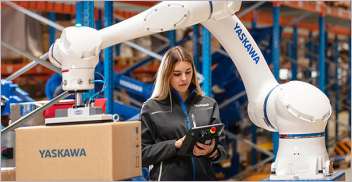For nearly a decade, the U.S. government has been developing ROS-M, a military version of the Robot Operating System. Built on ROS 1, ROS-M enabled the U.S. Department of Defense to benefit from open-source development practices while maintaining tight control over the community-developed code. However, support for Noetic, the current revision of ROS 1, is set to end in 2025. Stratom this week announced that it is part of a team that was chosen to deliver Stage II of the Modular Autonomy and Robotic Software, or MARS, program.
The MARS program involves the collaborative migration of Robotic Technology Kernel (RTK) software modules from ROS into ROS 2.
“With ROS being officially deprecated in 2025, this collaborative migration is essential to equip the DoD and the entire ground-vehicle robotics industry with a set of common robotic capabilities across a variety of platforms and programs to succeed in the ground vehicles space for the next 10 to 20 years,” stated Mark Gordon, president and CEO of Stratom. “At Stratom, we are now well-positioned as a thought leader in the ground vehicle robotics space and to rapidly produce prototype systems for future endeavors in less time, for less cost, and with less risk.”
Stratom claimed to be a leading developer of autonomous ground vehicles and robots for defense and commerical applications. The Boulder, Colo.-based company said it applies its experience in research and development, engineering, and systems integration to meet each customer's needs. Stratom offers military-proven tools, methods, services, and technologies, including unmanned cargo movement, robot refueling, robotic hazardous liquid transfer, and autonomous mobile robots (AMRs).
Stratom continues ROS 2 migration
Stratom said its ROS experience and past work with the core MARS program team will help it continue to provide insights toward successful performance. The service-disabled veteran-owned small business (SDVOSB) said its primary project objectives include enhancing and propagating the ROS-M ecosystem and defining software architectures and frameworks.
“As a small, agile company that can move quickly and is passionate about the work that we do, we look forward to leveraging our deep experience in this space to bring this project to life,” said Ryan DelGizzi, principal robotics engineer at Stratom. “As a core team member in executing a very meticulous step-by-step process to migrate, bring the various components together, and test the code, Stratom’s work with the ROS 2 migration will be instrumental in bringing next-generation robotics standards to integral DoD robotics software.”
The MARS program is intended to accelerate the software-centric development of robotics capabilities. The National Advanced Mobility Consortium (NAMC) is providing the program with critical autonomous infrastructure. Stratom, which is an NAMC member, is providing subject-matter expertise in support of NAMC’s efforts.
Stage I of the program focused on migrating RTK software packages from ROS to ROS 2 with minimal structural changes.
During Stage II, Stratom is one of four organizations selected to focus on larger architectural changes that move incrementally closer to the desired target architecture.
“The National Advanced Mobility Consortium is proud to serve as the leading platform in advancing innovation for manned and unmanned autonomy-enabled military solutions for ground systems in support of Department of Defense,” said Andrew Dallas, deputy executive director of NAMC. “To this end, NAMC is appreciative of Stratom’s ability and willingness to contribute their ground vehicle autonomy expertise towards developing a ROS 2 version of RTK that our members will be able to utilize and build upon to deliver autonomous capabilities for unmanned ground systems, such as the Robotic Combat Vehicle.”
Article topics
Email Sign Up
















